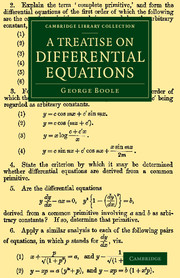-
Select format
-
- Publisher:
- Cambridge University Press
- Publication date:
- December 2014
- August 2014
- ISBN:
- 9781107049550
- 9781108067928
- Dimensions:
- Weight & Pages:
- Dimensions:
- (216 x 140 mm)
- Weight & Pages:
- 0.65kg, 518 Pages
You may already have access via personal or institutional login
Book description
The need to support his family meant that George Boole (1815–64) was a largely self-educated mathematician. Widely recognised for his ability, he became the first professor of mathematics at Cork. Boole belonged to the British school of algebra, which held what now seems to modern mathematicians to be an excessive belief in the power of symbolism. However, in Boole's hands symbolic algebra became a source of novel and lasting mathematics. Also reissued in this series, his masterpiece was An Investigation of the Laws of Thought (1854), and his two later works A Treatise on Differential Equations (1859) and A Treatise on the Calculus of Finite Differences (1860) exercised an influence which can still be traced in many modern treatments of differential equations and numerical analysis. The beautiful and mysterious formulae that Boole obtained are among the direct ancestors of the theories of distributions and of operator algebras.
Contents
Metrics
Altmetric attention score
Full text views
Full text views help Loading metrics...
Loading metrics...
* Views captured on Cambridge Core between #date#. This data will be updated every 24 hours.
Usage data cannot currently be displayed.
Accessibility standard: Unknown
Why this information is here
This section outlines the accessibility features of this content - including support for screen readers, full keyboard navigation and high-contrast display options. This may not be relevant for you.
Accessibility Information
Accessibility compliance for the PDF of this book is currently unknown and may be updated in the future.



